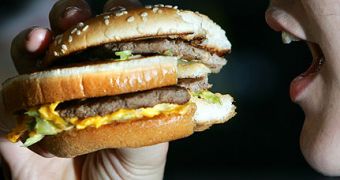Fast food is becoming increasingly popular with British women, as also is alcohol, a new study comes to show. At the same time, pressure to look a certain way (i.e. standardized thin) means more and more women are cutting down on nutritious foods, which further puts their health at risk. What’s worse, the effects of this poor diet will be felt in the next generation as well, the study also reveals, says the Daily Mail.
Lack of time and inclination to learn to cook translates in young women in a propensity for fast food. Peer pressure to be thin prompts them to go on a diet, most of the times one that is as unhealthy as it is inefficient in the long run. Increased alcohol consumption and stress put the final nail in the coffin of the health of women of all ages – these are the conclusions of a study by researchers Carrie Ruxton and freelance dietician and Manchester Metropolitan nutritionist Dr. Emma Derbyshire, writing in the journal Nutrition Bulletin.
“More than half (52 per cent) of schoolgirls are lacking magnesium, an energy-boosting mineral found in green leafy vegetables, nuts, meat and fish. One in four are not getting enough zinc, 30 per cent are lacking potassium, 16 per cent are low in iodine and almost half fail to reach recommended levels of iron in their diet. The analysis found that nineteen to 24 year olds have ‘particularly high’ intakes of salt and alcohol – raising their odds of circulatory diseases and breast cancer, respectively,” the Mail says of the findings of the study.
“The quality of a woman’s diet is fundamentally important across her lifespan, not only during the childbearing years. The diets of UK women are, in general, characterized by high intakes of salt and saturated fat, and low intakes of fruits, vegetables, fiber and oily fish. Women need to make better dietary choices to ensure they consume enough vitamins and minerals and, thus, safeguard their health,” the researchers say.
Commissioned by the Health Supplements Information Service, the study also comes to underline that, while men’s diet is also important, it’s mostly women who are most prone to cutting down or out entire food groups because they’re always watching their weight and trying to shift a few pounds more.

 14 DAY TRIAL //
14 DAY TRIAL //